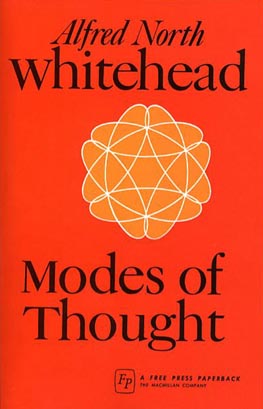Modes of Thought
Alfred North Whitehead (1938)
 "We think in generalities, but we live in details”, wrote Alfred North Whitehead.
Modes of Thought provides readers with an opportunity to think deeply about their own thinking — how we take the world. Whitehead teaches that the world comes at us
as processes and activities, not as things or events. Moreover, the processes we seek to make sense of come at us as abstracted fragments described in our own words. To understand the whole, we must develop a method of thought — steeped in an awareness that our thought processes, the categories of language we use, can distort our interpretation of our encounters with the world.
Recognized as the Godfather of process philosophy, Whitehead instructs us to embrace process so we might skillfully interpret the permanence and navigate the flux of reality. He urges us to “above all, assemble”. This means we should shrug off the tendency to start with systematized knowledge. Instead, we should first fight to collect as much fresh, firsthand experience
as possible. Few of us have been trained to develop an attitude of prioritizing the process
of assemblage. Instead, we tend to become cataloguers of “facts”, fitting our observations
to preconceived notions or theories. And as our expertise begins to grow, we fall victim
to the rush to homogenize — an attitude that inadequately attends to the particulars,
the details. By ignoring the particulars, we blunt discovery and stifle possibilities.
I must admit there are few books that I have read more than twice, but Modes of Thought — Whitehead’s thought-provoking guide to penetrating the universe — is one of them. “As we think, we live”, states Whitehead. This book’s wisdom provides nothing less than the intellectual sustenance that we all need to live the fullest life possible.
"We think in generalities, but we live in details”, wrote Alfred North Whitehead.
Modes of Thought provides readers with an opportunity to think deeply about their own thinking — how we take the world. Whitehead teaches that the world comes at us
as processes and activities, not as things or events. Moreover, the processes we seek to make sense of come at us as abstracted fragments described in our own words. To understand the whole, we must develop a method of thought — steeped in an awareness that our thought processes, the categories of language we use, can distort our interpretation of our encounters with the world.
Recognized as the Godfather of process philosophy, Whitehead instructs us to embrace process so we might skillfully interpret the permanence and navigate the flux of reality. He urges us to “above all, assemble”. This means we should shrug off the tendency to start with systematized knowledge. Instead, we should first fight to collect as much fresh, firsthand experience
as possible. Few of us have been trained to develop an attitude of prioritizing the process
of assemblage. Instead, we tend to become cataloguers of “facts”, fitting our observations
to preconceived notions or theories. And as our expertise begins to grow, we fall victim
to the rush to homogenize — an attitude that inadequately attends to the particulars,
the details. By ignoring the particulars, we blunt discovery and stifle possibilities.
I must admit there are few books that I have read more than twice, but Modes of Thought — Whitehead’s thought-provoking guide to penetrating the universe — is one of them. “As we think, we live”, states Whitehead. This book’s wisdom provides nothing less than the intellectual sustenance that we all need to live the fullest life possible.
- David Waters
Description of Modes of Thought
Modes of Thought was published in 1968 by Free Press/Macmillan Publishing (first published 1938). The book comprises 6 lectures delivered by Alfred North Whitehead at Wellesley College in Massachusetts and 2 lectures given at the University of Chicago. The chapters are titled: Importance Expression Understanding Perspective Forms of Process Civilized Universe Nature Lifeless Nature Alive.The book finishes with an epilogue titled “The Aim of Philosophy”. Whitehead was considered one of the world’s most famous mathematicians, co-authoring with Bertrand Russell the 3-volume Principia Mathematica, a work that attempted to demonstrate mathematics as the preferred language for making a complete description of the world and man in it. Falling short of this objective, Whitehead turned his attention to philosophy, leaving Cambridge in England and coming to the United States to join Harvard University’s Department of Philosophy in 1924 at the age of 63.
